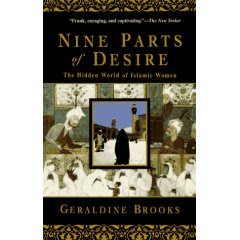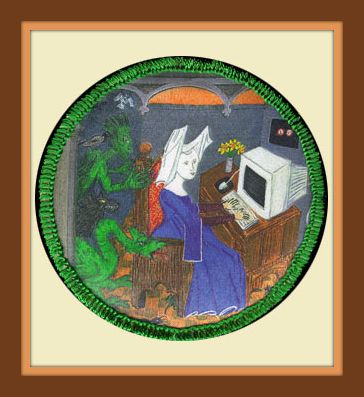One chapter was on veiling. This is an area I am interested in. It seems to me that veiling is linked with fundamentalism and nationalism and with other tendencies that supress women. I know that there is dispute over this. Many women feel that veiling protects and empowers them. This might be. I think that there should be standards of modesty, but have issues with extremes. There were many Indian women in our neighborhood in NYC who wore brightly colored head scarves and beautiful and loose fitting saris, and I thought they were modest without being so compelled into narrow standards of dress. I have a major problem with the idea that women are caretakers of men's chastity and sexual desires and that they need to veil in order to protect men from illicit sexual thoughts or acts. Why can't we focus more on how men need to control their thoughts and how parents and other adults need to teach boys that they need not be subject to every passing thought? Veiling seems to be for the benefit of men, rather than for women. At least, this is my perception, which is admittedly mostly ignorant and from a Western perspective. I thought a bit about how religion is used as a means of social control for women. And for general human behavior too. It seems like it is used less as a way to proscribe gender roles for men--Brooks talks about how certain admonitions in the Koran which seem to apply equally to men and women, or those that center on men's behaviors, are not enforced among men. I thought about our church and how the pulpit is used (not in malicious ways) to circumscribe appropriate female behavior, leading, at times, those who do not fit the molds of appropriate gendered behavior to feel guilty or smothered. One of Brooks' points is that a great deal of Islamic traditions surrounding gender--which vary greatly from country to country and from locality to locality--are not based in Koranic teachings but are most a cultural artifact of Islam. It makes me wonder what things we do in the church are similarly cultural and not based in any eternal truths. (I personally think there might be a lot.) This was our book selection for the month. It was a fairly interesting read, but I thought Geraldine Brooks tried to cover too many topics, to the exclusion of depth in any one given area. I was interested to read a bit about the history of Mohammed and his wives. And to see where some of the Muslim customs surrounding women come from. One woman in our group pointed out how similar she saw Mohammed and Joseph Smith. Looking back, it would have been interesting to delve into that a bit.
This was our book selection for the month. It was a fairly interesting read, but I thought Geraldine Brooks tried to cover too many topics, to the exclusion of depth in any one given area. I was interested to read a bit about the history of Mohammed and his wives. And to see where some of the Muslim customs surrounding women come from. One woman in our group pointed out how similar she saw Mohammed and Joseph Smith. Looking back, it would have been interesting to delve into that a bit.
The feeling that I most had after reading the book was the desire to dive in and learn some more, and hopefully from Islamic women, not a Western, self-labelled secularist, who might have an ax to grind. That's not to say that she didn't have some interesting and valuable observations and conclusions in her book. She did. I would like to broaden my understanding by looking at a variety of souces. I just put a few more books on Islam, gender roles, and women on my list to read.
Wednesday, February 13, 2008
Nine Parts of Desire
Labels:
Book Group,
Feminism,
Off the Stacks
Subscribe to:
Post Comments (Atom)

2 comments:
I had a similar reaction to the book and to our discussion. I thought we would talk more about the similarities between Joseph Smith and Muhammed, but I wonder if people were not comfortable with that. Now that you mention it, I wish we had talked about the difference in how the Quran is used to control women's behavoir and not men's.
I liked this book when I first read it years ago--mostly because it opened my eyes to so many aspects of the Muslim world that I had previously been unaware of. I also remember finding the chapters about sporting events to be particularly fascinating.
And you know I have lots of the same thoughts as you do on gender roles as taught from the male pulpit...
Post a Comment